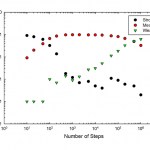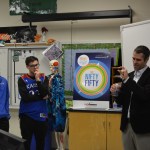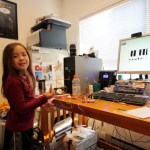education
With national school nutrition standards up for reauthorization in Congress, a new survey finds that most Americans support healthier school meals.
Earlier this week, the W.K. Kellogg Foundation released the findings of a national survey in which 86 percent of respondents said they support today’s school nutrition standards and 88 percent support government-funded farm-to-school programs that provide schools with fresh, local produce. In 2010, the signing of the Healthy, Hunger-Free Kids Act ushered in the first update of school food and drink nutrition standards in 15 years, and as of June…
This past academic year was my 14th as a professor at Union, and my last as department chair. I'm on sabbatical for the 2015-16 academic year, doing my very best to avoid setting foot in an academic building, so it will be September 2016 before I'm teaching a class again. This seems like a good opportunity to reflect a bit on my experiences to this point, which in turn is a good excuse for a blog post. So, here are some things I've found out over the last 14 years of being a college professor:
-- Teaching is really hard. My first year, when colleagues from other schools asked how I was…
Every day in the U.S., more than 40 people die after overdosing on prescription painkillers. Deaths from a more notorious form of opiates — heroin — increased five-fold between 2001 and 2013. Addressing this problem — one that’s often described as a public health crisis — requires action on many fronts, from preventing abuse in the first place to getting those addicted into treatment. But when it comes to overdoses, there’s one answer we know works: naloxone.
Naloxone is a safe prescription medicine that’s highly effective in reversing an otherwise deadly opioid overdose. Typically, emergency…
I've been doing a bunch of conferencing recently, what with DAMOP a few weeks ago and then Convergence last week. This prompted me to write up a couple of posts about conference-related things, which I posted over at Forbes. These were apparently a pretty bad fit for the folks reading over there, as they've gotten very little traffic relative to, well, everything else I've posted during that span. Live and learn.
Anyway, I'm fairly happy with how both of those turned out, and on the off chance that they'll do better with the ScienceBlogs crowd, let me link them here:
-- What Are Academic…
I've been pretty quiet about educational matters of late, for the simple reason that I was too busy teaching to say much. The dust having settled a bit, though, I thought I would put some notes here about what I did this past term, and what worked.
I had two sections of the introductory Newtonian mechanics course in the Spring term; this was off the normal sequence for engineering majors (the engineers mostly take this in the Winter term of their first year), but this year we had yet another larger-than-expected engineering class, and needed to open another section. I picked up both of these…
A common hurdle in the field of occupational health and safety is delivering what can sometimes be life-saving information to the people who need it most. After all, not all employers are amenable to workplace health and safety education. But what if safety advocates could find and connect with the most at-risk workers out in the community? Perhaps even reach vulnerable workers with safety education before they experience an injury at work?
New research from the University of Illinois-Chicago School of Public Health could help safety advocates do just that. Linda Forst, director of the school…
Analyzing online searches and social media activity has often been suggested as a way to track and maybe even predict the spread of diseases. And it’s a great idea — if it’s done right, it could offer public health workers real-time surveillance and a jumpstart at containing dangerous outbreaks. But there’s a hitch. How can we attempt to decipher between online activity triggered by the possibility of actual disease symptoms and online activity triggered by simple curiosity?
That was the question Sherry Towers and her colleagues set out to answer. At the very least, they wanted to gain some…
Matt "Dean Dad" Reed is moving to New Jersey, and confronting one of the great dilemmas of parenting (also at Inside Higher Ed): what school district to live in. This is a big problem for lots of academics of a liberal sort of persuasion:
From a pure parental perspective, the argument for getting into the most high-achieving, “desirable” district we can afford is open-and-shut. TB and TG are wildly smart kids who will rise to the expected level; I want the level to be high. That strategy also has the benefit of higher resale value for a house, since other parents make the same calculation…
Engaging in a bit of tab clearance before I head off to DAMOP tomorrow afternoon, I noticed that I still had How to Teach an Ancient Rape Joke open. This is because while I found it kind of fascinating, it's not all that directly relevant to what I do, and I didn't have anything all that concrete to say beyond "Huh. That's interesting." So it languished in one of the many, many open tabs cluttering up Chrome, too interesting to just close but not anything I could see a clear angle to comment on. And eventually it was sort of forgotten until I set about paring down open tabs before an out-of-…
Back in October or so, SteelyKid's first-grade class started a weekly journaling exercise. Every Monday, we were supposed to send in a sheet with some prompts on it-- words about something interesting that happened over the weekend, and the kids started the day writing about... whatever it was.
I was a little dubious about having six-year-olds write journal entries, but, you know, I'm happy to defer to professional teachers, so we did it. Most weeks. some days we forgot, or SteelyKid would get all muley and refuse to help think of a topic and words.
Yesterday was the end-of-year party for…
After 18 years as a professional house cleaner in the suburbs of Chicago, Magdalena Zylinska says she feels very lucky. Unlike many of her fellow domestic workers, she hasn’t sustained any serious injuries.
Zylinska, 43, cleans residences in the metropolitan Chicago area five days a week. An independent contractor, she cleans two to three houses each day. Fortunately, she doesn’t do the job alone — she always works with at least one other person, so they can help each other with much of the lifting and other types of repetitive physical labor that can often lead to preventable injuries and…
Last week, I did a post for Forbes on the surprisingly complicated physics of a light bulb. Incandescent light bulbs produce a spectrum that's basically blackbody radiation, but if you think about it, that's kind of amazing given that the atoms making up the filament have quantized states, and can absorb and emit only discrete frequencies of light. The transition from the line spectra characteristic of particular atoms to the broad and smooth spectrum of black-body radiation is kind of amazing.
The way you get from the one to the other is through repeated off-resonant scattering. The…
One of the highlights of teaching introductory mechanics is always the "karate board" lab, which I start off by punching through a wooden board. That gets the class's attention, and then we have them hang weights on boards and measure the deflection in response to a known force. This confirms that the board behaves like a spring, and you can analyze the breaking in terms of energy, estimating the energy stored in the board, and the speed a fist must have to punch through the board. As a sort of empirical test, we can drop a half-kilogram mass from the appropriate height to match the…
One of the points I make repeatedly in teaching introductory mechanics (as I'm doing this term) is that absolutely every problem students encounter can, in principle, be solved using just Newton's Laws or, in the terminology used by Matter and Interactions, the Momentum Principle. You don't strictly need any of the other stuff we talk about, like energy or angular momentum.
Of course, just because you can solve any problem using the Momentum Principle doesn't mean that you want to solve those problems that way. As an example of a problem that's really annoying to solve with just the Momentum…
A few things about the academic job market have caught my eye recently, but don't really add up to a big coherent argument. I'll note them here, though, to marginally increase the chance that I'll be able to find them later.
-- First, this piece at the Guardian got a lot of play, thanks in part to the dramatic headline Science careers: doomed at the outset but even more thanks to the subhead "Has it become harder for graduate students to thrive, and are our best potential scientists giving up on academia?" Most of the people I saw re-sharing it used basically just that last clause, often…
This Nifty Fifty Podcast features, Dr. Loren Anderson, physicist from West Virginia University, speaking to Tuscarora High School about the Milky Way Galaxy, astronomy, massive stars, and his career path to becoming a physics professor. Read the full blog here.
A couple of weeks ago, after one of my Forbes posts, I got contacted by a publicist working for Makey Makey. They really wanted publicity in Forbes, but that's above my pay grade; I did, however, say that it sounded like the sort of thing my kids would get a kick out of, and I could mention it here...
So, they sent me one. It's a small circuit board with a USB connector and a bunch of places for alligator-clip leads, and functions as an input device for the computer-- if you complete a circuit from one of the clip leads to ground, it records that as a mouse click, or a key press of some sort…
“Those who know that the consensus of many centuries has sanctioned the conception that the earth remains at rest in the middle of the heavens as its center, would, I reflected, regard it as an insane pronouncement if I made the opposite assertion that the earth moves.” -Nicolaus Copernicus
There are certain words that simply get people's hackles raised, shutting off the part of their brain that normally responds to reason and instead results in an emotional response taking over. For some, that word is "theory," one of the words with the biggest gap between its colloquial and scientific uses…
In just a year, electronic cigarette use has tripled among American teens. And considering that no one really knows what the related health impacts are and any regulatory framework is lagging far behind the growing popularity of e-cigarettes, public health advocates say it’s time for action.
Earlier this week, the Centers for Disease Control and Prevention released new data from the 2014 National Youth Tobacco Survey finding that current e-cigarette use among high school students, which is defined as using at least once in the prior 30 days, nearly tripled — from 4.5 percent in 2013 to 13.4…
Low income and poor health tend to go hand in hand — that’s not a particularly surprising or new statement. However, according to family medicine doctor Steven Woolf, we have yet to truly grasp the extent to which income shapes a person’s health and opportunity to live a long life. And if we don’t confront the widening income inequality gap, he says things will only get worse.
“There’s a general awareness that people who have poor education or low incomes have worse health outcomes, but our sense is that we don’t really appreciate the magnitude of the problem,” Woolf told me. “Every time I…






